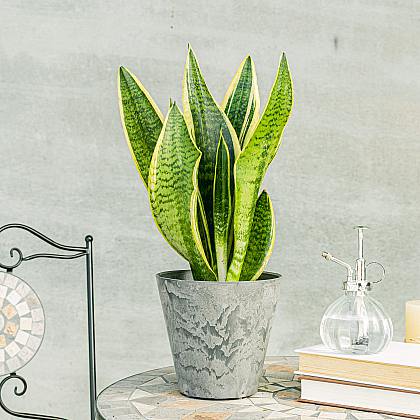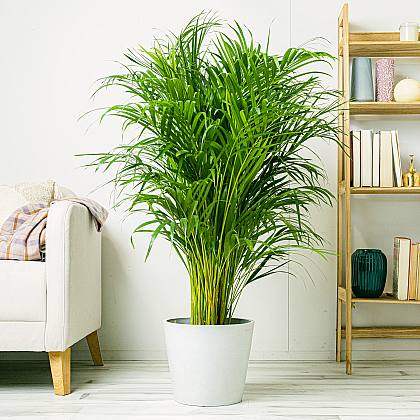Complete nutrition for your leafy green plants
Attention plant lovers! Have you ever wondered how to ensure complete nutrition for your leafy green plants? In this article, we're going to explore the...
Attention plant lovers! Have you ever wondered how to ensure complete nutrition for your leafy green plants? In this article, we're going to explore the importance of proper feeding for these very special plants. We'll find out what your nutritional needs are and how to avoid deficiencies in your leaves. In addition, we will give you practical tips on how to fertilize them correctly and discuss whether it is better to use organic products or chemical fertilizers. Get ready to learn and grow your leafy greens like never before!
The Importance of Proper Nutrition for Green Leafy Plants
The importance of proper nutrition for leafy green plants is critical to their healthy growth and development. Did you know that green leaves are responsible for photosynthesis, the process in which plants obtain energy? That's why it's essential to make sure they get all the nutrients they need to carry out this vital function. When plants lack complete nutrition, they may exhibit symptoms such as yellowing, wilted, or blotchy leaves. This indicates that something is wrong with your diet. That's why it's important to identify the specific nutritional needs of each plant and provide them with the right nutrients in the right amount. In addition, it should be noted that each nutrient plays a specific role in optimal plant growth. For example, nitrogen promotes the development of healthy green leaves, while phosphorus stimulates the formation of strong roots. It is also necessary to consider other factors such as irrigation and light, as they directly influence the absorption and use of nutrients by plants. In short, proper nutrition is key to keeping our leafy green plants in optimal condition, thus ensuring their long-term beauty and health.
Identifying Your Plants' Nutritional Needs
When it comes to caring for our leafy green plants, it's critical to identify and meet their nutritional needs. Our seedlings depend on us for the nutrients they need for healthy growth and development. But how can we know exactly what nutrients they need? Do not worry! Here are some practical tips to help you identify the nutritional needs of your plants.
First, take a close look at your plants. Examine its leaves and stems for signs of nutritional deficiencies. Are the leaves yellowing or wilting? Are there any unusual spots or discolorations? These can be signs that your plant isn't getting adequate nutrients.
It's also important to know the food preferences of each type of plant. Some leafy green species, such as spinach or lettuce, have specific nutrient requirements, while others may be more flexible. Do some research on the nutritional needs of your particular plant and make sure you're providing it with the right nutrients.
Remember that water also plays a crucial role in the nutrition of your plants. Proper watering allows the roots to absorb nutrients from the soil. Pay attention to the frequency and amount of water you give your plants, as too much or too little can affect their ability to absorb nutrients properly.
In short, identifying the nutritional needs of your plants is essential to ensure their optimal health and growth. Take a close look at your plants, research their food preferences, and pay attention to proper watering. Soon you'll see how your little plants thank you by looking beautiful and radiant!
The essential nutrients for Optimal Growth
When it comes to nourishing our leafy green plants, it's important to make sure they're getting the essential nutrients for optimal growth. These nutrients are like food for our plants, providing them with everything they need to thrive and look lush. There are several key nutrients that our plants need in adequate amounts. The first is nitrogen, which is critical for leaf growth and the development of a vibrant green color. Then we have phosphorus, which helps promote root development and flowering. Potassium is another essential nutrient, as it contributes to the resistance of plants to disease and environmental stress. In addition to these main nutrients, there are also other elements needed in smaller amounts, such as calcium, magnesium, and iron. These nutrients play important roles in different metabolic processes in plants. Making sure our plants receive a balanced diet of these essential nutrients is crucial to their health and vitality. So the next time we feed our leafy green plants, let's remember to give them all the nutrients they need to grow strong and beautiful.
Practical tips for fertilizing your plants
Fertilizing your plants can be challenging, but with a few practical tips you can make sure they're getting the nutrients they need to grow healthy and strong. First, it's important to read the fertilizer instructions and follow the recommended doses. Don't overdo it! Too much fertilizer can damage your plants' roots. In addition, it is essential to fertilize regularly, but not excessively. A good habit is to do this every two weeks during the growing season. Also remember that not all plants have the same nutritional needs, so it's important to research what type of fertilizer is right for your leafy green plants. If you see signs of nutritional deficiency, such as yellow or wilted leaves, consider increasing the frequency or amount of fertilization. On the other hand, don't forget to water your plants well before applying the fertilizer, as this will help the nutrients to be absorbed properly. And last but not least, don't be afraid to try different types of fertilizers. Organic products can be a more natural and environmentally friendly option, while chemical fertilizers can be more potent and faster in their action. Find what works best for you and your plants! With these practical tips, you'll be able to keep your leafy green plants happy and healthy for a long time.
How to Avoid Nutritional Deficiencies in Leafy Greens
If you are
a lover of green leafy plants, you are surely concerned about their health and appearance. One way to keep them in tip-top condition is to avoid nutritional deficiencies. How to do it? It's easier than you think. First, it's essential to know the specific needs of your plants. Each species has different nutritional requirements, so it's important to research and understand what nutrients are essential for their growth. Once you know what they need, you can provide them with the right nutrients through fertilization. It is advisable to use balanced fertilizers specific to green leafy plants, as they contain the necessary nutrients in the correct proportions. In addition, it is important to maintain good watering and ensure that they receive the right amount of light. Too much or too little water and light can affect the plants' absorption of nutrients. Finally, if you prefer a more natural option, you can opt for organic products instead of chemical fertilizers. Organic products are less harsh on the environment and can also be beneficial to the health of your plants. In short, avoid nutritional deficiencies in your leafy green plants by knowing their specific needs, providing them with the right nutrients through fertilization, maintaining good watering, and ensuring they receive the right amount of light. This way you can enjoy beautiful and healthy plants!
The Role of Irrigation and Light in Plant Nutrition
Watering and light play a critical role in nourishing leafy green plants. Water is essential for plants to absorb nutrients from the soil and transport them through their tissues. Without proper watering, plants can suffer from water stress and will not be able to get the nutrients needed for healthy growth. On the other hand, light is also crucial for the process of photosynthesis, in which plants convert light energy into chemical energy for their growth. Leafy greens need a sufficient amount of direct sunlight to carry out this process efficiently. If they don't get the right amount of light, they can grow slowly, turn yellowing, or even wilt. It is important to find the right balance between watering and light exposure to ensure optimal nutrition for our plants. Looking at each plant's individual needs and adapting watering and light exposure as needed is key to keeping them healthy and vibrant.
Organic Products vs. Chemical Fertilizers: Which Is the Better Option?
The choice between organic produce and chemical fertilizers can generate passionate debate among gardeners. Some argue that organic produce is the best choice because of its reduced environmental impact and ability to improve soil health in the long run. Others advocate the use of chemical fertilizers, as they can provide nutrients quickly and efficiently. However, it is important to consider several factors before making a decision. Organic products are typically gentler on plants and soil, reducing the risk of burns or damage. In addition, by using organic products, the accumulation of chemical residues in the soil and plants is avoided, which is beneficial for both our health and the environment. On the other hand, chemical fertilizers can be a convenient option when a quick boost of nutrients is needed, especially in situations of severe nutritional deficiency. However, it is important to follow the instructions carefully to avoid overdosing and damaging the plants. Ultimately, the choice between organic and chemical fertilizers depends on your specific needs as a gardener and your personal values in terms of sustainability and environmental health. Whatever your choice, always remember to maintain a balance and not overuse fertilizers to ensure proper nutrition and optimal growth of your leafy green plants.
So there you have it! Now you know how important it is to provide proper nutrition to your leafy green plants. Identifying their nutritional needs and providing them with essential nutrients will ensure optimal growth and healthy, green leaves. Remember to use quality fertilisers and follow practical advice to avoid nutritional deficiencies. Also, don't underestimate the role of watering and light in nourishing your plants. And finally, consider using organic products instead of chemical fertilizers, as they can be a better alternative to take care of both your plants and the environment. Now it's up to you to explore more about this fascinating topic and find out how you can nourish your leafy green plants in the best possible way. Good luck and enjoy your garden full of life!


